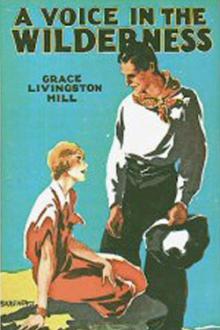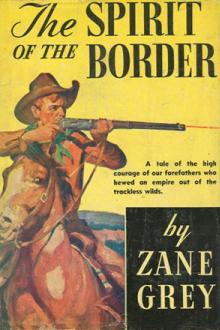The Last Trail, Zane Grey [universal ebook reader txt] 📗

- Author: Zane Grey
Book online «The Last Trail, Zane Grey [universal ebook reader txt] 📗». Author Zane Grey
Helen, her heart throbbing wildly, went to the side of Mrs. Zane, who was kneeling by the couch. She saw a delicate girl, not over eighteen years old, with a face that would have been beautiful but for the set lips, the closed eyelids, and an expression of intense pain.
"Oh! Oh!" breathed Helen.
"Nell, hand me the scissors," said Mrs. Zane, "and help me take off this dress. Why, it's wet, but, thank goodness! 'tis not with blood. I know that slippery touch too well. There, that's right. Betty, give me a spoonful of brandy. Now heat a blanket, and get one of your linsey gowns for this poor child."
Helen watched Mrs. Zane as if fascinated. The colonel's wife continued to talk while with deft fingers she forced a few drops of brandy between the girl's closed teeth. Then with the adroitness of a skilled surgeon, she made the examination. Helen had heard of this pioneer woman's skill in setting broken bones and treating injuries, and when she looked from the calm face to the steady fingers, she had no doubt as to the truth of what had been told.
"Neither bullet wound, cut, bruise, nor broken bone," said Mrs. Zane.
"It's fear, starvation, and the terrible shock."
She rubbed Mabel's hands while gazing at her pale face. Then she forced more brandy between the tightly-closed lips. She was rewarded by ever so faint a color tinging the wan cheeks, to be followed by a fluttering of the eyelids. Then the eyes opened wide. They were large, soft, dark and humid with agony.
Helen could not bear their gaze. She saw the shadow of death, and of worse than death. She looked away, while in her heart rose a storm of passionate fury at the brutes who had made of this tender girl a wreck.
The room was full of women now, sober-faced matrons and grave-eyed girls, yet all wore the same expression, not alone of anger, nor fear, nor pity, but of all combined.
Helen instinctively felt that this was one of the trials of border endurance, and she knew from the sterner faces of the maturer women that such a trial was familiar. Despite all she had been told, the shock and pain were too great, and she went out of the room sobbing.
She almost fell over the broad back of Jonathan Zane who was sitting on the steps. Near him stood Colonel Zane talking with a tall man clad in faded buckskin.
"Lass, you shouldn't have stayed," said Colonel Zane kindly.
"It's—hurt—me—here," said Helen, placing her hand over her heart.
"Yes, I know, I know; of course it has," he replied, taking her hand.
"But be brave, Helen, bear up, bear up. Oh! this border is a stern
place! Do not think of that poor girl. Come, let me introduce
Jonathan's friend, Wetzel!"
Helen looked up and held out her hand. She saw a very tall man with extremely broad shoulders, a mass of raven-black hair, and a white face. He stepped forward, and took her hand in his huge, horny palm, pressing it, he stepped back without speaking. Colonel Zane talked to her in a soothing voice; but she failed to hear what he said. This Wetzel, this Indian-hunter whom she had heard called "Deathwind of the Border," this companion, guide, teacher of Jonathan Zane, this borderman of wonderful deeds, stood before her.
Helen saw a cold face, deathly in its pallor, lighted by eyes sloe-black but like glinting steel. Striking as were these features, they failed to fascinate as did the strange tracings which apparently showed through the white, drawn skin. This first repelled, then drew her with wonderful force. Suffering, of fire, and frost, and iron was written there, and, stronger than all, so potent as to cause fear, could be read the terrible purpose of this man's tragic life.
"You avenged her! Oh! I know you did!" cried Helen, her whole heart leaping with a blaze to her eyes.
She was answered by a smile, but such a smile! Kindly it broke over the stern face, giving a glimpse of a heart still warm beneath that steely cold. Behind it, too, there was something fateful, something deadly.
Helen knew, though the borderman spoke not, that somewhere among the grasses of the broad plains, or on the moss of the wooded hills, lay dead the perpetrators of this outrage, their still faces bearing the ghastly stamp of Deathwind.
CHAPTER VIHappier days than she had hoped for, dawned upon Helen after the first touch of border sorrow. Mabel Lane did not die. Helen and Betty nursed the stricken girl tenderly, weeping for very joy when signs of improvement appeared. She had remained silent for several days, always with that haunting fear in her eyes, and then gradually came a change. Tender care and nursing had due effect in banishing the dark shadow. One morning after a long sleep she awakened with a bright smile, and from that time her improvement was rapid.
Helen wanted Mabel to live with her. The girl's position was pitiable. Homeless, fatherless, with not a relative on the border, yet so brave, so patient that she aroused all the sympathy in Helen's breast. Village gossip was in substance, that Mabel had given her love to a young frontiersman, by name Alex Bennet, who had an affection for her, so it was said, but as yet had made no choice between her and the other lasses of the settlement. What effect Mabel's terrible experience might have on this lukewarm lover, Helen could not even guess; but she was not hopeful as to the future. Colonel Zane and Betty approved of Helen's plan to persuade Mabel to live with her, and the latter's faint protestations they silenced by claiming she could be of great assistance in the management of the house, therefore it was settled.
Finally the day came when Mabel was ready to go with Helen. Betty had given her a generous supply of clothing, for all her belongings had been destroyed when the cabin was burned. With Helen's strong young arm around her she voiced her gratitude to Betty and Mrs. Zane and started toward the Sheppard home.
From the green square, where the ground was highest, an unobstructed view could be had of the valley. Mabel gazed down the river to where her home formerly stood. Only a faint, dark spot, like a blur on the green landscape, could be seen. Her soft eyes filled with tears; but she spoke no word.
"She's game and that's why she didn't go under," Colonel Zane said to himself as he mused on the strength and spirit of borderwomen. To their heroism, more than any other thing, he attributed the establishing of homes in this wilderness.
In the days that ensued, as Mabel grew stronger, the girls became very fond of each other. Helen would have been happy at any time with such a sweet companion, but just then, when the poor girl's mind was so sorely disturbed she was doubly glad. For several days, after Mabel was out of danger, Helen's thoughts had dwelt on a subject which caused extreme vexation. She had begun to suspect that she encouraged too many admirers for whom she did not care, and thought too much of a man who did not reciprocate. She was gay and moody in turn. During the moody hours she suspected herself, and in her gay ones, scorned the idea that she might ever care for a man who was indifferent. But that thought once admitted, had a trick of returning at odd moments, clouding her cheerful moods.
One sunshiny morning while the May flowers smiled under the hedge, when dew sparkled on the leaves, and the locust-blossoms shone creamy-white amid the soft green of the trees, the girls set about their much-planned flower gardening. Helen was passionately fond of plants, and had brought a jar of seeds of her favorites all the way from her eastern home.
"We'll plant the morning-glories so they'll run up the porch, and the dahlias in this long row and the nasturtiums in this round bed," Helen said.
"You have some trailing arbutus," added Mabel, "and must have clematis, wild honeysuckle and golden-glow, for they are all sweet flowers."
"This arbutus is so fresh, so dewy, so fragrant," said Helen, bending aside a lilac bush to see the pale, creeping flowers. "I never saw anything so beautiful. I grow more and more in love with my new home and friends. I have such a pretty garden to look into, and I never tire of the view beyond."
Helen gazed with pleasure and pride at the garden with its fresh green and lavender-crested lilacs, at the white-blossomed trees, and the vine-covered log cabins with blue smoke curling from their stone chimneys. Beyond, the great bulk of the fort stood guard above the willow-skirted river, and far away over the winding stream the dark hills, defiant, kept their secrets.
"If it weren't for that threatening fort one could imagine this little hamlet, nestling under the great bluff, as quiet and secure as it is beautiful," said Helen. "But that charred stockade fence with its scarred bastions and these lowering port-holes, always keep me alive to the reality."
"It wasn't very quiet when Girty was here," Mabel replied thoughtfully.
"Were you in the fort then?" asked Helen breathlessly.
"Oh, yes, I cooled the rifles for the men," replied Mabel calmly.
"Tell me all about it."
Helen listened again to a story she had heard many times; but told by new lips it always gained in vivid interest. She never tired of hearing how the notorious renegade, Girty, rode around the fort on his white horse, giving the defenders an hour in which to surrender; she learned again of the attack, when the British soldiers remained silent on an adjoining hillside, while the Indians yelled exultantly and ran about in fiendish glee, when Wetzel began the battle by shooting an Indian chieftain who had ventured within range of his ever fatal rifle. And when it came to the heroic deeds of that memorable siege Helen could not contain her enthusiasm. She shed tears over little Harry Bennet's death at the south bastion where, though riddled with bullets, he stuck to his post until relieved. Clark's race, across the roof of the fort to extinguish a burning arrow, she applauded with clapping hands. Her great eyes glowed and burned, but she was silent, when hearing how Wetzel ran alone to a break in the stockade, and there, with an ax, the terrible borderman held at bay the whole infuriated Indian mob until the breach was closed. Lastly Betty Zane's never-to-be-forgotten run with the powder to the relief of the garrison and the saving of the fort was something not to cry over or applaud; but to dream of and to glorify.
"Down that slope from Colonel Zane's cabin is where Betty ran with the powder," said Mabel, pointing.
"Did you see her?" asked Helen.
"Yes, I looked out of a port-hole. The Indians stopped firing at the fort in their eagerness to shoot Betty. Oh, the banging of guns and yelling of savages was one fearful, dreadful roar! Through all that hail of bullets Betty ran swift as the wind."
"I almost wish Girty would come again," said Helen.
"Don't; he might."
"How long has Betty's husband, Mr. Clarke, been dead?" inquired Helen.
"I don't remember exactly. He didn't live long after the siege. Some say he inhaled the flames while fighting fire inside the stockade."
"How sad!"
"Yes, it was. It nearly killed Betty. But we border girls do not give up easily; we must not," replied Mabel, an unquenchable spirit showing through the sadness of her eyes.
Merry voices interrupted them, and they turned to see Betty and Nell entering the gate. With Nell's bright chatter and Betty's wit, the conversation became indeed vivacious, running from gossip to gowns, and then to that old and ever new theme, love. Shortly afterward the colonel entered the gate, with swinging step and genial smile.
"Well, now, if here aren't four handsome lasses," he said with an admiring glance.
"Eb, I believe if you were single any girl might well suspect you of being a flirt," said Betty.
"No girl ever did. I tell you I was a lady-killer in my day," replied Colonel Zane, straightening his fine form. He was indeed handsome, with his stalwart frame, dark, bronzed face and rugged, manly bearing.
"Bess said you were; but that it





Comments (0)